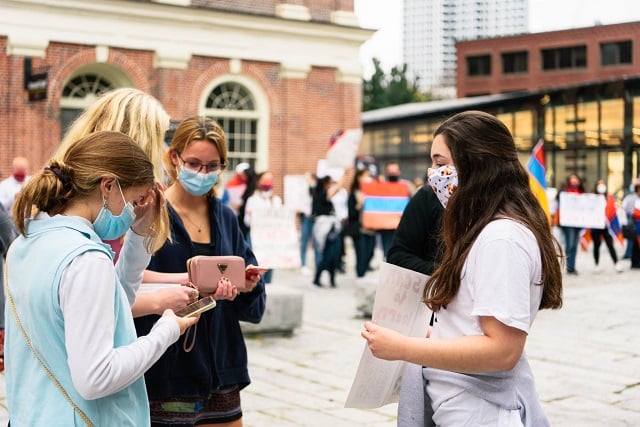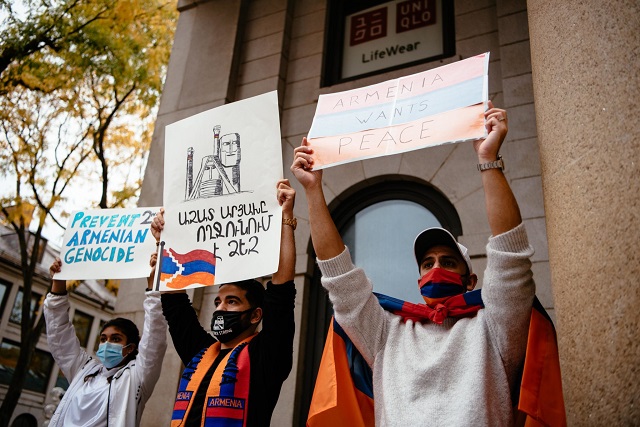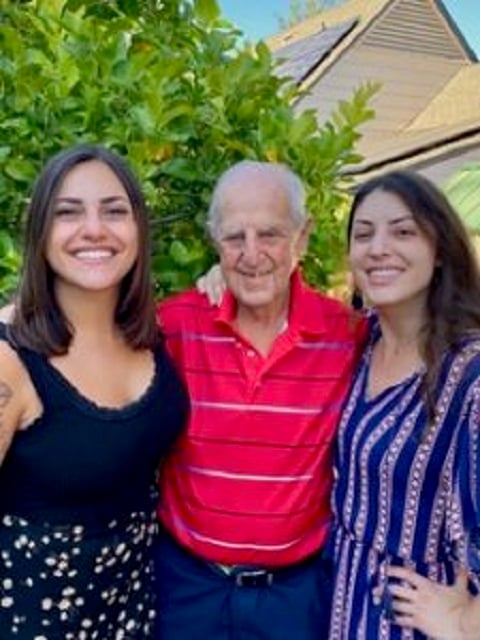The Armenian Weekly. Anguish is described as “extreme unhappiness caused by physical or mental suffering. Usually preceded by a tragedy or events with a profound meaning.” It’s one word that describes millions of Armenians in the homeland and the diaspora at this moment in time. Suddenly, 1915 to 1923 is no longer a historical reference or story from our ancestors. We are reliving the fear, the anxiety, the frustration and yes, the anguish. The symptoms are obvious and commonly held: difficulty sleeping, the pain in our hearts for every young man lost defending our dream and the paralysis that comes from lack of closure. Perhaps we will all gain an even greater understanding of the physical and psychological impact of oppression, atrocities and dispossession. There is a sadness that pervades our communities as we feel helpless to impact the tragedy. It defies the logic of human civility. Why would a peace loving, indigenous and contributing civilization be subjected to such monstrous events…again and again and again…by the same ethnic tribe? Ironically the sadness I see on the faces of all generations has a silver lining. It means hundreds of thousands, and probably millions, care to the depths of their souls. We can appreciate the incredible resiliency of the citizens of Armenia and Artsakh. They are fighting valiantly for their homes and our ancestral lands. It is very personal. The response of the diaspora has been incredible. I have seen hundreds of comments and actions of support from individuals who are even on the periphery of our communities. That’s what is paradoxically both inspiring and traumatic.
This tragedy touches the very core of our identity: the survival of our homeland, the attack by the 2020 version of the Young Turks, the menacing presence of the former Tartars now known as Azerbaijan and the re-emergence of the pan-Turkic nightmare that left 1.5 million dead and truncated our family trees. Some or all of these are the source of anguish in our people today. For decades, we have been telling the world that unless the perpetrators of genocide are brought to justice, history will repeat itself. Based on the continuation of atrocities, our world has viewed this as rhetoric. Well, ask the Cambodians, the Rwandans, the Bosnians, the people of Darfur and the Kurds. We didn’t learn, and the warning, unfortunately, has rung true. And now it comes full circle for our people. What is particularly disgusting is that Turkey seems to have an insatiable appetite for committing atrocities regardless of whether it is led by Sultans, Ittihads or the current despot.
During these dark days, I think about my grandparents and how they dealt with the separation, the unknowns, the physical hardships and the searches for survivors. When they finally had a grasp of their losses and status by the early 1920s, they were “homeless” as their homeland had been usurped. They faced the anguish of their losses with the task of rebuilding in the diaspora. We are urgently experiencing a similar type of anguish. Inspired by our grand ancestors, we must also discover the inner strength to fulfill our responsibility. To accomplish this we can draw on two sources: the remarkable courage of our brethren in Armenia and Artsakh who are sacrificing everything to preserve our national identity and the commitment of our survivor generation that laid the foundation of the diaspora. These are clear lessons of the mental resilience required in facing tough odds. We learned from our grandparents that despite the presence of sadness in our hearts, we can overcome its impact by doing what we do best: building a future. In that regard, those of us in the diaspora, who are restless, anxious and clinging to social media, must channel our anguish into action. It will contribute to the solution for our nation and act as therapy in our own lives. Don’t let the sadness create paralysis.
This is a time for all Armenians to be dynamic and innovative, to help the homeland and to prevent the endless anxiety of despair. We all can be active in some way. I recently got a call from my uncle in California two days ago. We stay in touch often. He has been an incredible mentor with his strong faith and wisdom. When I answered the phone, I could feel his energy in the first sentence he uttered. “Stepan, it’s Uncle Paul. I wanted to talk to you about a letter I wrote to my Armenian congresswoman about the mistruths in the media concerning the Armenians and Artsakh.” He proceeded to tell me about her response and his call to action to broadcast the truth. Mind you, my uncle is 93 years old and epitomizes the meaning of living for every day. He told me that his next letter would focus on the need for America to contain Turkey with sanctions, withdrawal from Incirlik and expulsion from NATO. This one is very personal as his mother was from Adana. We all have moments of sadness during these times. My uncle’s call was timely and inspiring. There are so many ways to contribute, and his example was so important.
Read also
I would summarize being action-oriented into several broad categories: fundraising, advocacy and lobbying, public education and opinion, faith and ecumenical. Any of these can be contributed to communally or, if your situation requires, individually. It is a matter of looking inward and making a commitment to focus on an area of passion or interest. Last week, I suggested a behavioral change by giving on a regular frequency. My thought was $500 per family for $1 billion per year. I was thrilled to see the All Armenian Fund proposing $50 per month to generate the necessary sustainable cash flow. It is the same principle. Give regularly as we do to pay other obligations. The fund is currently at $150+ million. The next few months will determine whether the recurring process takes hold in our communities. If it does, the fund will sustain the growth we have seen in the last month. All of us have to take this personally. The next few months will be critical as winter sets in, and the displaced population needs comfort. How about if we all abstain from Christmas gifts this year and give the comparable amount in the name of loved ones to Artsakh? This single act of love and devotion would generate millions in the American Armenian community. How about it?
The advocacy work can be supported in a number of ways. Support the activities requested by the ANCA and Assembly. Make those calls, send the emails, sign the petition and support the legislative initiative. You can also financially support our advocacy groups so they have the resources to continue and expand the professional work they accomplish on behalf of our people. We can’t expect a few individuals to absorb the cost of lobbying and travel continuously. Besides, there are other activities that are dependent on the availability of financial resources. Many state advocacy groups are lobbying for sanctions and also divestiture plans in Turkey. This can be very effective but requires our best talent to make inroads. There is room for all in this worthwhile effort.
The public opinion activities include demonstrations, vigils, rallies and other public events. Social media is also a significant and emerging vehicle. Thousands of posts on Facebook, Instagram and Twitter offer millions the opportunity for education and action. The responsibility we bear is to remain informed ourselves so that we can properly articulate our positions and combat propaganda. It is a serious responsibility. Frankly, I have been inspired by the work of our younger generation with their organizing skills and sustained energy. The creative planning and unified efforts have been impressive in all major cities. When speaking with many of the organizers, I feel a commitment to the longer term which is gratifying. Too often our public rallies focus inward and fail to give clear messages to the public. We have also seen new thinking as demonstrators distribute QR codes or share websites to gain more information for the public to learn and take action. Taking our message to the freeways and bridges has been done in a most organized and responsible manner. Our job is to support these events. Stay informed and attend. Similar to giving financially, attending one rally is not enough. Be there just as our soldiers are there.

AYF Greater Boston “Nejdeh” Chapter member Nairi Krafian raising awareness, sharing QR code with passers-by at Faneuil Hall silent protest, October 24, 2020 (Photo: Knar Bedian)
The faith and prayer component has been active, and the church is leading in this area. When we speak of “Christian Armenia” to the world, it is important to live those words. The ecumenical community has its own niche of influence and has a role to play in our multifaceted strategy. Our faith during these times keeps us grounded.
We always have a choice. Fill the bottomless pit of anguish with meaningful actions that you can accomplish individually or organizationally. In speaking to some friends in Armenia, I constantly heard how inspired they are by the support of the diaspora. Imagine that those under attack gain hope from us. If that doesn’t motivate you to participate in continuous activity, then you haven’t been listening. What Armenia does not need is for the diaspora to lose momentum in a month or two. They don’t need a diaspora that is frozen by the anxiety and the despair of this war. They want and need the diaspora that is firing on all cylinders…focused, united and sustainable. If you are part of the current wave, thank you and I pray that you continue. If you are filled with anguish that has overwhelmed you, come off the sidelines and onto the field. Your people need you. Everyone makes a difference and in aggregate it will lead to a better tomorrow: a free Artsakh and the emergence of a stronger Armenian nation.





















































